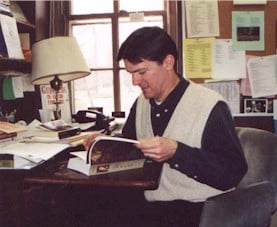Jim Hood is set. He’s got a happy family, an associate professorship within a distinguished English department, and a recently published book. And now, after only two years at Guilford, the Board of Trustees has granted him tenure.
Schooled in Miami through high school, Hood entered Guilford College in 1975, married Sarah Beth Terrill after his junior year, and graduated with a degree in Religious Studies. From there he enrolled at Yale Divinity School, where he received a master’s degree in religion and literature, knowing full well he wanted to be an academic, but not knowing just what field he wanted to work in.
Four years later, back to the south Hood went, earning a Ph.D. in English at the University of North Carolina at Chapel Hill in 1991. He then taught for five years at Mercyhurst College, a Catholic school in Erie, Pa., and most recently for three years at Mars Hill College in western North Carolina, a Baptist school.
Somewhere in all that Hood and his wife had a daughter, Julia, who is now 16 and a junior in high school. And then a son, Daniel, who is now 11, a sixth grader.
Hood’s stay at Guilford began in the fall term of 1999. His contract upon entering stated that he would receive tenure after only two years, given his past teaching experience. Those two years have passed, and Hood got his wish.
Here, Jim Hood candidly gives his thoughts on Guilford, the students, the English department, his own writing, and his teaching.Guilfordian: Do you like it here?
Jim Hood: Very much, very much. I’m a lifer.
G: Yeah?
Hood: As far as I know, as long as nothing wild happens.
G: Harvard calls.
Hood: I don’t think that’s going to happen. But I really do like it. I love Guilford students. I’m getting to teach interesting courses like the politics of horror course I’m teaching this semester, Gothic Lit. And I’m looking forward to next year when I’ll probably do a senior seminar on literature and ethics.
The curriculum is an interesting one to teach in and the students are fun and interesting and fascinating and challenging to work with. I think Guilford students are interested in their own education in a way that wasn’t my experience elsewhere. In other words, students are very engaged in how they’re being taught. That’s been my experience here, that they come and talk to you about how the class is going and really take control of things in a way that they don’t necessarily do in other places.
It took me a little time to adjust to that because I had been in places where the assumption was that the professor was much more authoritarian, and it’s less so here. But I’m absolutely comfortable with it now.
G: What is your goal here? What do you look forward to academically?
Hood: Three things, I guess I would say, in terms of my aspirations connected with Guilford in this position. One, is to continue to teach, and to develop and teach focused, interesting courses. I’m really interested in the course I’m teaching now, and I’m looking forward to developing other courses. That’s one of the things that really invigorates me is developing new courses, and refining the ones that I have. In the other teaching that I’ve done I had taught a lot of mainly survey kinds of courses. And now I’m getting to develop more thematically and historically focused courses.
Second thing is, I published a book last year that was based on my dissertation that I spent a lot of time since I finished at Chapel Hill revising that. I’m hoping to get a chance to work on another book. I’ve got idea for another book, and so that’s in the works. That’s probably going to be on Victorian sentimental religious literary texts. So, I’ve done some work on that, and I’ve got something else in the works that may work out this year.
Thirdly, I’m really interested in Guilford as an institution, so I want to do what I can to help make Guilford’s future bright and to preserve its neatness as a place that offers a Quaker education. I guess as part of that institutionally I’m thinking about more experiential learning kinds of things.
I’m interested in working on that sort of stuff, particularly thinking about ways to keep the education that we provide here at the cutting edge of what’s valuable and what students really are interested in. That all sounds kind of like theory, but I have some pretty specific ideas about ways that that might happen.
And connected with that, I guess – and this might actually be a fourth thing – I’d love to lead the London program sometime.
G: You mentioned the book you wrote based on your thesis.
Hood: Yeah, it’s called “Diving Desire: Tennyson and the Poetics of Transcendence.” It’s a study of all of Tennyson’s major poems. It basically takes a look at artist figures and lovers in Tennyson, and talks about how the desire for transcendence gets manifested as, I would argue, the central organizing theme for the entire corpus of Tennyson’s work.
This is a revision of my dissertation. So when I assign revision projects to students in the Capstone course, I know a lot about revision.
G: What are your thoughts on the English department and where it’s headed?
Hood: One of the things that I’ve just really, really loved about being at Guilford, is that the department we have now – since getting Eleanor [Branch] in last year – is really solid. There’s a range of age and interest and perspective on literature.
We’ve got Eleanor, and Carolyn [Beard Whitlow]. And Amanda [Bailey] doing her good, sort of cutting edge stuff. And in some ways I am, in other ways I’m a step back from the cutting edge, but really solidly grounded in somewhat more traditional literary texts, but interested in other things.

